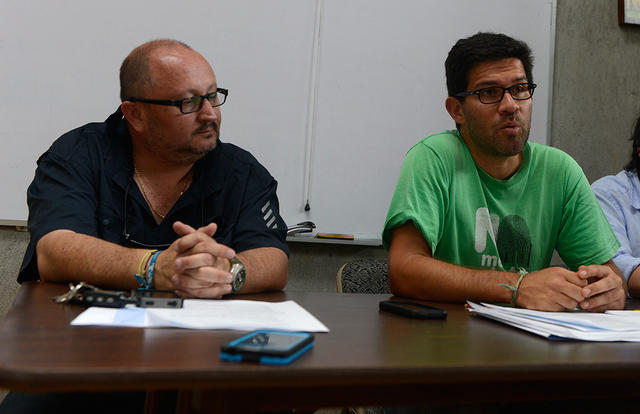Slain turtle conservationist honored at 50th anniversary of Costa Rica National Park System – Activists call for truth commission to investigate other violent incidents
By Zach Dyer
26 August 2013 CABO BLANCO, Puntarenas (The Tico Times) – With the Pacific Ocean crashing against the beach at Cabo Blanco Absolute Nature Reserve, the Costa Rican National System of Conservation Areas and the Ministry of the Environment and Energy (MINAE) posthumously honored Jairo Mora for his dedication to marine conservation during the celebration of the 50th anniversary of the national park system on Saturday. As government leaders, park rangers and civil society celebrated Cabo Blanco’s golden anniversary, the national park system finds itself in a moment of self-reflection as dwindling budgets and rising violence threaten the parks and their protectors. Mora’s mother, Fernanda Sandoval, accepted the honors on behalf of her son. “It’s something very meaningful as a mother because he lived his life and gave his life to protect nature, biodiversity, trees, everything,” Sandoval told The Tico Times. “I know that they will never forget, he will always be in people’s thoughts,” she said. After recognizing Mora’s conservation efforts, MINAE Vice Minister Ana Lorena Guevara signed an executive decree authorizing park rangers to carry firearms in protected areas. Officials signed another executive decree that established incentive pay for rangers to perform police work. Poaching, illegal mining, and drug trafficking have become a dangerous trifecta for park rangers, who increasingly are out-gunned by trespassers and criminals who use the uninhabited parks for illegal activities. Diminishing funds have exacerbated security concerns. [more]
Jairo Mora honored at 50th anniversary of Costa Rica’s National Park System 
By Lindsay Fendt
27 August 2013 (The Tico Times) – It has been nearly three months since the murder of Costa Rican turtle conservationist Jairo Mora, and despite arrests in the case, some environmentalists are still searching for answers. In a San José press conference on Tuesday, representatives from three different conservation groups voiced concerns about the investigation and the government’s response following the murder. “Until now the Judicial Investigation Police [OIJ] have not confirmed a single fact about the beach’s situation with us,” said Didiher Chacón, the Costa Rica director for the Wider Caribbean Sea Turtle Network. “It seems like everything they say publicly is just repeating what the suspected murderers told them regarding the poaching situation.” On July 31, police arrested eight people, seven of them suspected of participating in Mora’s murder and the kidnapping of four foreign volunteers who were returning from a night of collecting turtle eggs on Moín Beach, on Costa Rica’s northern Caribbean coast. All of the suspects are known turtle egg poachers, according to police documents obtained by The Tico Times. In a press conference following the arrests, OIJ officials described tensions between Mora and Moín poachers prior to the killing. Officials said the assailants originally stopped the volunteers’ car to rob them, but angry with Mora for continuing his beach patrols and going to the police for help, they decided to kill him once they discovered he was in the car. Though Chacón told The Tico Times he was relieved that arrests have been made, he expressed concerns at the Tuesday press conference regarding the OIJ’s statements about the killers’ motive. “They say that they were angry that Jairo was taking the nests,” Chacón said. “On that beach we only had eight protected nests plus some other hidden ones. In reality, these nests had insignificant effects on the poachers and doesn’t match with the idea that Jairo was a threat in egg extraction.” OIJ Director Francisco Segura declined to comment on the environmental aspects of the beach, but reaffirmed the OIJ’s version of events. “They say that we just adopted what the suspects told us as the truth,” Segura told The Tico Times. “That is absolutely a lie. We said what we said because we have sufficient evidence to say it. It is not always necessary to interview every person involved in a case.” Environmentalists at the meeting also expressed discontentment with the Environment Ministry’s response to turtle poaching on the country’s Caribbean coast, and they accused officials of failing to keep promises made during open meetings in the months following the murder, including plans for a protected area in Moín. “What concerns us is that the development of the [proposed] conservation area is progressing much slower than the development of the mega-projects in the area,” said Mauricio Álvarez of the Costa Rican Conservation Federation, referring to nine waterfront developments including a major port expansion and a refinery installation. Conservationists also called for the formation of a truth commission to investigate other violent incidents against environmentalists, and for a response to a proposal to eliminate the culture of turtle egg consumption in Costa Rica by eliminating the legal sale of eggs to the public. [more]
Costa Rica environmental groups still raising questions in Jairo Mora case
